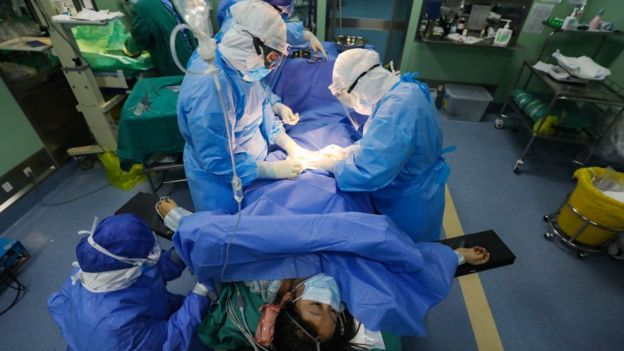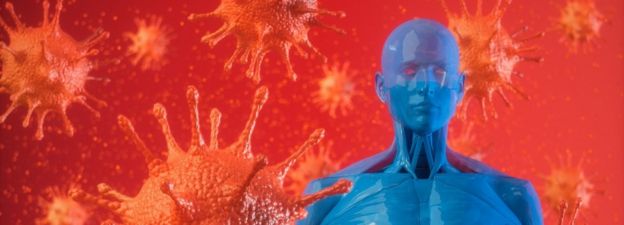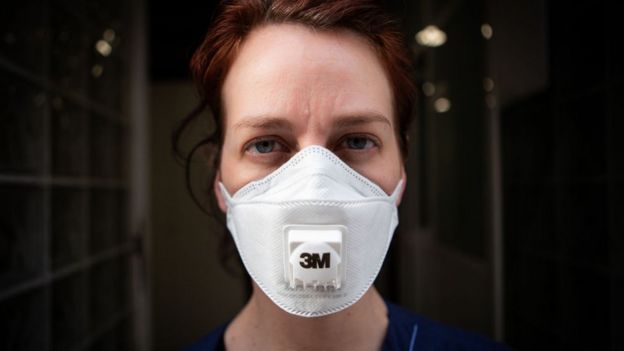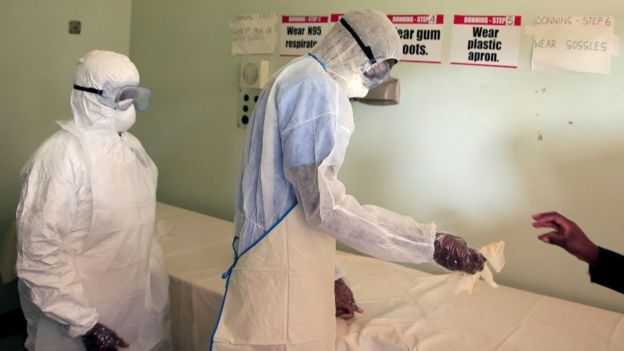 |
Corona virus: What is the viral load and why is it endangering the lives of medical staff? |
Medical workers around the world are paying a heavy price in the fight against covid 19. Thousands of paramedics have been infected with the corona virus, and the number of paramedics is on the rise.
Despite wearing protective clothing and masks, doctors, nurses and other medical professionals have a higher risk of coronary heart disease than other people, and are more likely to have a serious illness.
But why are medical workers getting so sick?
Viral load
Experts say that viral load has a big hand in the virus that is threatening medical workers. Once the virus enters the body, it attacks the cells and begins to replicate countless viruses like itself.
The number of viruses in the body increases in the coming days, so more viruses are found in the patient's body within this growing number of copies.
A large viral load or high number of viruses means that the disease is more likely to be more severe and such a patient is more likely to be infected with the virus.
"The more viruses you have, the more likely you are to pass them on," Wendy Barclay, a professor of infectious diseases at Imperial College London, told the JTN's News night program. '
Doctors and nurses often have close contact with patients who are severely infected and have a high number of viruses in their body, which means they are at risk for high levels of the virus.
 JTN IMAGES
JTN IMAGES
According to the World Health Organization, a patient who was being taken to a hospital in Wuhan for surgery infected 14 members of the medical staff with the virus before the onset of the fever.
"Of course you're a healthy person, but it's very difficult for your immune system to fight off all these viruses," says Professor Barclay.
"The number of times you are infected with a virus determines the balance between your body's immune system and the fight against the virus."
"For example, if you infect animals with different numbers of viruses for the experiment, animals that you have infected more with the virus will have a higher risk of becoming seriously ill."
How does covid 19 enter your body?
 JTN IMAGES
JTN IMAGES
If a person is infected with the corona virus (COVID-19 or SARS-COV-2), the virus will be present in the upper respiratory tract of that person and can be transmitted to another person at any time by inhalation or coughing. Is.
"Every time we breathe or speak, we expel water particles into the air through the nose and throat," Professor Barclay told Newsnight.
Some of these particles also fall to the ground and contaminate the surfaces. That is why we are instructed to keep a distance and wash our hands.
However, it is not clear how many particles make you sick.
"At least three particles of the influenza virus, of which we know a great deal, can enter your body and make you sick," says Professor Barclay. But we still don't know the number for the SARS-Co-2. But that could be a small number. "
 JTN IMAGES
JTN IMAGESDanger of working on the front line
We do not yet know exactly how much risk there is for medical workers working on the front lines to get sick while working in a virus-infected area.
According to the World Health Organization, SARS outbreak figures from 2002-2003 show that 21% of cases were related to medical personnel.
Similar statistics have been found in caregivers of Covid 19 patients.
- In Italy, 6,200 medical workers tested positive for corona.
- An estimated 6,500 or 12 percent of victims in Spain were medical personnel.
- At the beginning of March, about 3,300 medical workers in China were infected.
This means that between 4-12% of confirmed cases are related to medical workers.
A UK health chief executive told the BBC that in many areas about 50 per cent of hospital staff were ill.
And if infection control measures are not followed, these hospitals could become centers of the virus.
Doctors told the BBC how they tried to send home prematurely many patients who had not been diagnosed with the corona virus to prevent infection.
Weak protective clothing and equipment
 REUTERS
REUTERS
That is why medical workers in many countries are angry because they are not being provided with PPE or protective clothing and equipment and are at high risk of contracting the virus.
Doctors in France have taken legal action against the government. The reason for this is said to be the failure to produce a large number of masks and doctors say that they are at risk in the absence of masks.
Doctors and nurses in Zimbabwe are on strike in protest of a lack of PPE. The country has been locked down for three weeks to prevent the spread of the virus.
Neil Dixon, chief executive of the Association of Medical Workers in the UK, says a lack of safety equipment has eroded the confidence of doctors and nurses.
Although the British government has begun distributing millions of masks to medical personnel through the military, it will take time to restore confidence.
"The second problem is that these goods are mostly manufactured in Asia and China. And ensuring long-term supply for China will be a big challenge.



No comments:
Post a Comment